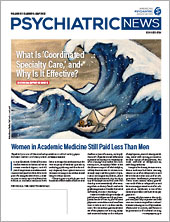During a typical consultation-liaison (C-L) psychiatry service week, we consulted on two women on the oncology service, both in their 60s, with similar situations: they had recently been diagnosed with cancer and were hospitalized for chemotherapy induction. They had no prior psychiatric history. Both women had suddenly started crying, shouting, staying up all night, and occasionally refusing care and were ultimately found to have delirium. The patients, however, had two notable differences: one was White, and the consult question was “anxiety,” while the other was Black, and the consult question was “agitation.”
Given otherwise similar patient profiles, the team’s differing consult questions suggested an implicit racial bias influencing their patient interactions. Implicit bias describes the unconscious attitudes and associated stereotypes held toward another individual based on that individual’s race, gender, religion, ethnicity, or other personal characteristics. Unfortunately, implicit bias is widespread among U.S. health care workers toward people of color, particularly Black Americans.
Rates of mental illness among Black Americans are similar to those of the population as a whole. However, compared with White Americans, Black Americans often receive poorer quality of care, do not receive culturally appropriate care, and are less likely to be offered evidence-based medication or psychotherapy. They are more frequently diagnosed with schizophrenia and less frequently diagnosed with mood disorders, which can lead to inappropriate treatment and adverse outcomes. They also have lower rates of outpatient mental health service utilization and higher rates of inpatient hospitalization.
When health care professionals hold implicit biases, they risk perpetuating health care disparities—preventable differences in the care patients receive and burden of disease experienced by individuals from socially disadvantaged populations. Implicit bias also contributes to patients’ “structural vulnerability”—their risk of negative health outcomes due to the interface of socioeconomic, political, and cultural/normative hierarchies. For example, studies show that patients who identify as Black/African American have a higher risk of being restrained in the emergency department than patients who identify as White. Factors such as insurance status, homelessness, and poverty are more prevalent among people of color due to generations of policy-driven, systemic, and structural racism that continue to be perpetuated. They further contribute to patients’ structural vulnerability.
Returning to our cases, the primary team’s implicit bias led them to interpret the Black female patient’s behavior as agitation, when similar behavior by the White female patient was framed as anxiety. This stigmatized the Black female patient as potentially dangerous with health care staff, increasing the risk of potentially unnecessary management, such as use of restraints and calling security.
C-L psychiatrists are in a unique position to identify when implicit bias and structural vulnerability may be influencing patient diagnosis, care, and even the consult question. C-L psychiatrists can improve patients’ clinical course by gathering information on their structural vulnerabilities and the social, cultural, and societal elements that impact their symptoms and interactions with the team. Health care staff should recognize and reflect on their own implicit biases during patient interviews to avoid improper diagnoses and treatments.
Finally, C-L psychiatrists are in a central position to educate teams about implicit biases that may be influencing their patient perceptions. By encouraging culturally and socially aware patient care, C-L psychiatrists can help transform medicine to become a more socially just and equitable profession. ■


